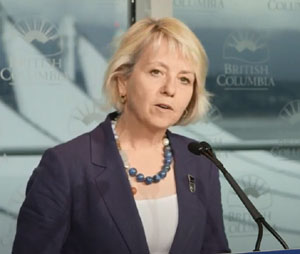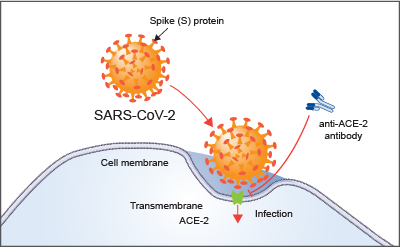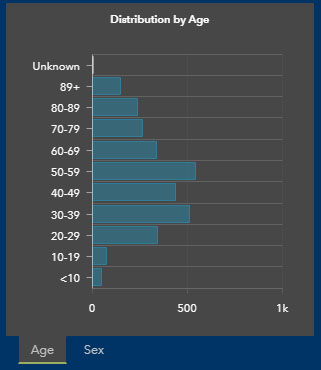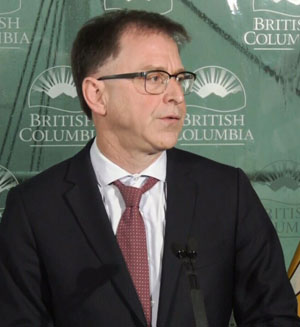
Thursday July 3, 2020 ~ VANCOUVER, BC
by Meaghan Power, reporter & Mary Brooke, B.Sc. editor ~ West Shore Voice News
After the Canada Day holiday yesterday, there were two days of COVID-19 statistics to report in BC. Today’s COVID-19 briefing by Provincial Health Officer Dr Bonnie Henry and Health Minister Adrian Dix included the announcement of 24 new test-positive cases (15 during June 30 to July 1, and 9 during July 1 to 2) and three more deaths during to COVID-19 (two in Vancouver Island Health and one in Fraser Health — all in long-term care).
Among the new cases, one of those is someone here on Vancouver Island. While Dr. Henry would not disclose the community where the individual resides, she clarified that the person was infected while travelling as opposed to having acquired the infection locally. All contacts of this new case have been contacted and are quarantining and being monitored. That brings the total of confirmed cases on Vancouver Island to 132.
For all of BC the number of cases is 2,940 (distributed as 989 Vancouver Coastal Health, 1,553 in Fraser Health, 132 within Island Health region , 201 in Interior Health, and 65 in Northern Health.
Long-term health impacts from COVID-19 infection:

Dr. Henry outlined the effects of COVID-19 on the body after a “recovery”. She said that the virus affects many systems in the body and binds to ACE-2 receptors in the heart muscle, lungs, blood vessels, and the back of the throat, which can cause clotting. It can also lead to organ damage, cognitive effects, strokes, confusion (due to exacerbation of the immune system), difficulty breathing, and a long-standing fatigue.
The ACE-2 receptor also has a role to play vis-a-vis blood type. People with O+ blood may have a stronger immune response to this viral infection, compared to people with A, B or AB blood types. Blood types have different levels of prevalence in certain racial groups — for example Caucasians have a high level of O-type blood whereas Asian races have more prevalence of A and B. More to come on this in the days ahead.
Timing of information may have youth re-think this disease:

Dr Henry has been long in coming out with this information already known about how the COVID-19 virus binds to the ACE-2 receptors in the body. Earlier mention of this with clarity may have caused some people — especially younger people who think it’s a mild disease or that only seniors get it — to think twice about loosening up on physical distancing in recent weeks.
As of today July 2, there have been 49 cases in children under age 10 in BC, and 76 in youth up to age 19 — that’s 125 cases, a number that has been steadily increasing since students heading back to school and the economy in general reopening. In the 20 to 29 year age group, there have been 344 cases of COVID-19 in BC.
Visits in long-term care coming soon:
Dr Henry acknowledged that “seniors and elders and families are eager to be together” and asked that family members remain patient as long-term care and assisted living administration finalize their visitor safety plans. On June 30 she announced the easing of the visitor ban that was first imposed in March. Soon the protocols will allow for one designated person to physically reunite with their loved ones in a designated space.
Dr. Henry emphasized the continuing existing order that requires a 14-day quarantine for people entering or returning to BC. She voiced her expectation that all visitors adhere to BC’s “travel manners” including social distancing and adhering to established small social bubbles. She underscored these individual responsibilities when asked a question about the recent concerns of Americans apparently stopping in Port Renfrew on their way to Alaska (though that evidence is based on licence plates which may have other explanations).
No half measures this summer:
“A summer in Phase 3 of BC’s Restart Plan means all of us working together to keep our province safe. Whether you live in BC, are a visitor from another province or are in Canada for essential travel, we all have to do our part to protect our communities, our elders and our loved ones,” said Dr Henry this afternoon.
“Any traveller from outside BC needs to understand that we have established clear rules for safe social interactions, which include keeping our bubbles small, maintaining a safe distance from others and staying away from others if you are feeling ill.”
“Like all British Columbians, whether a resident or not, if you develop symptoms of COVID-19, isolate yourself immediately and call 811 to arrange to be tested,” the Provincial Health Officer said with a firmer tone than usual — a tone that might have been expected earlier on in the pandemic.
“We remind anyone coming to British Columbia from outside of Canada that all travellers are required to self-isolate for 14 days prior to interacting with others,” she said.
Dr Henry said there can be no half-measures or exceptions when it comes to COVID-19. That management of the infection spread requires ongoing monitoring, modifying activities as needed and actively managing any new cases that emerge.

Surgeries back on track:
During today’s afternoon briefing, Health Minister Adrian Dix reviewed health system utilization. Provincially, emergency room visits broke 6,000 per day last week (up to 6,263 on June 29), the highest number since March.
Surgical services are back to normal volumes, he said, while emphasizing the significance of that accomplishment by physicians, nurses, and all other health care workers.
“People are returning and using emergency rooms all over the province,” said Dix. He said the number changes daily but that “in terms of surgical renewal and emergency room visits things are back to normal and getting back to normal in our health care system”.
Island Health surgical sites have performed over 7,600 surgeries since May 28, when elective surgeries commenced again across BC. In the past week alone, 6,622 surgeries have been performed in BC.
Chief Medical Officers lauded:
Dix lauded the work of Chief Medical Health Officers in all health authorities in the province, including Island Health’s Dr. Richard Stanwick as well as First Nations Health Authority’s Dr. Shannon Waters, who lives on Vancouver Island. Waters will be providing a COVID-19 update focused on indigenous communities on Monday.
All community outbreaks have been declared over, and 2,603 people who previously tested positive for COVID-19 are now considered to be fully recovered.

===== LINKS:
BC Centre for Disease Control (all BC COVID-19 stats)


